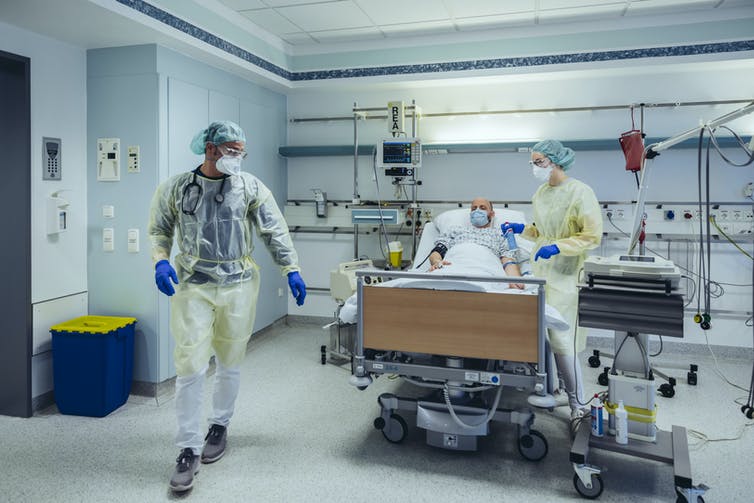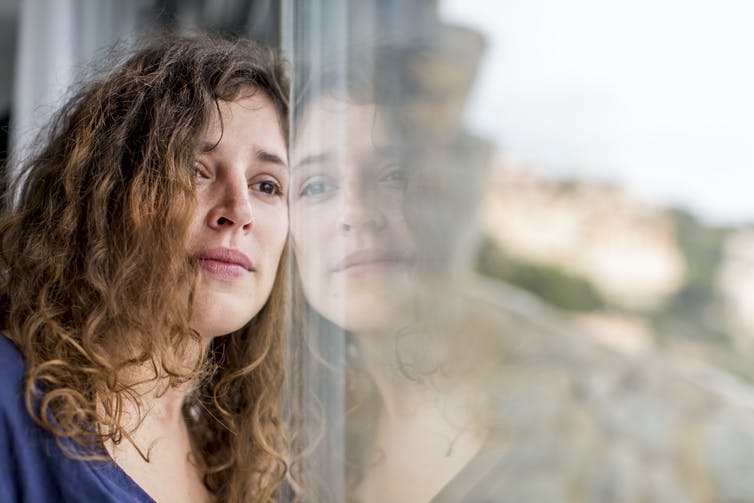People are eager to return to normal after a year of coronavirus, but is the U.S. there yet? Hardly. The ongoing psychological and spiritual damage caused by the pandemic is rising, too.
Guilt and shame are two prevailing emotions surrounding COVID-19.
This guilt stems in part from the fact that anyone could be a potential carrier of the virus – so anyone, then, could unwittingly pass it to another person. Guilt can also arise when a person looks at the national and global death tolls and wonders how they were spared.
Guilt also happens when family members can’t visit loved ones undergoing treatment at a hospital, or when someone with COVID-19 survives but reads about a infected stranger who died. A particular type of response called survivor’s guilt can occur when people lose loved ones due to a traumatic event, or when they themselves experienced the threat but survived it.
As a psychologist and a doctor of emergency medicine, we have personal experience with patients suffering from survivor’s guilt as they watched loved ones succumb to COVID-19. And as the pandemic continues, we expect to see more.

Westend61 via Getty Images
Survivor’s guilt is complicated
Survivor’s guilt can occur whether or not a person caused an event to occur. It can happen to a sole survivor of a plane crash who had nothing to do with the accident, or an intoxicated driver who crashed his car and killed his passenger. Either way, the person feels they were spared an event while others perished, and feelings of grief and anxiety result. Survivor’s guilt can affect up to 90% of survivors of traumatic events. COVID-19 survivors in Bergamo, Italy, one of the world’s hardest-hit towns, have experienced this on a widespread basis. Some people have reported a type of survivor guilt when they have been vaccinated, with many wondering why they have been so fortunate.
Conflicting messages from the federal and various state and local governments haven’t helped. Because some leaders have suggested that COVID-19 is no worse than the flu, millions of Americans did not wear masks. By some estimates, not wearing masks could have contributed to 130,000 deaths.
Also, a person can spread COVID-19 without knowing they have the disease. This uncertainty combined with loneliness might have led to social gatherings that weren’t the safest. Perhaps an elderly parent decides to risk illness rather than spend the holiday alone. Many parents, including our own, say they want to make the most out of the time they have right now; they cannot bank on being around next year.
In the world of palliative medicine, there is no shortage of examples of patients choosing quality of life over quantity, sometimes refusing lifesaving but invasive treatment so they can spend time engaged in activities they might not otherwise be able to enjoy. This is not unusual at any age – it’s not at all uncommon for people to make choices that have potential tremendous costs, from smoking to skydiving.
So is someone who inadvertently passed along COVID-19 at fault? For example, how do we cope with the guilt when we know we passed the virus on to a family member? Generally people don’t ascribe this kind of blame when they inadvertently pass the flu to someone who gets sick, or perhaps even dies. We do not see countless news stories assigning blame when someone with the common cold does not wear a mask at the grocery store. We believe that people should be forgiving of themselves should they accidentally transmit COVID-19. Self-forgiveness requires recognition we cannot control everything and that our motives were benign.

EMS-Forster Productions/DigitalVisio via Getty Images
Dealing with survivor’s guilt
Symptoms of survivor’s guilt include anxiety, depression, headache, nausea, sleeplessness and fatigue. It can lead to post-traumatic stress disorder. Managing survivor’s guilt is an individual process, and what works for one may not work for another. Interventions include deep breathing, meditation, relaxation, exercising, a healthy diet, journaling, adopting a hobby, getting a pet, watching comedies and reaching out – volunteering or engaging with family, friends and co-workers. For some, spirituality and faith are also important.
Nonreligious people may find comfort by connecting directly to nature, where life and death are part of a grand cycle, and nature itself may have a purpose that ordains when one person succumbs while another survives.
As people pass through the grieving process, healing comes by recognizing our interconnectedness to each other. But when the U.S. quarantined, many people lost that most basic and primal coping mechanism. Instead, Americans, sometimes alone, have had to explore existential truths that may have been painful, even devastating. Yet in many ways, the country has already prevailed. Through mourning our losses and suffering heartbreak, our medical, psychological and spiritual well-being remains a strength.

